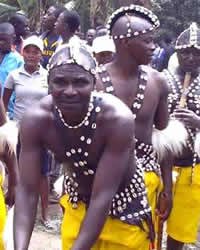The Afusari or Afizere are an ethnic group of Nigeria. They are also known by several other names, including Afizarek, Afusare, Fezere, Fezerek, Fizere, Izere, Jarawa, Jarawan Dutse, and Jari.
Harold Gunn (1953) traces the root of the Afizere people from a region in southern Kaduna, Kaduna state, Nigeria, called Chawai. Their origin is in three successive migrations involving three patrilineal groups. The first comprised the Shere/Fobour family group. These two brothers first settled at Shere and due to their rapid “Muturu” (cattle) expansion, the Fobur “patriarch” moved southward to Afozi and later to Fobur plains while his shere kin remained occupying what is now Shere District. Another family group left Fobur to found what is now referred to as Kwall; the origin of Irigwe (Miyango) people.
The Afizere people are well distributed over five major traditional districts. They well inhabit territories within Jos North, Jos East, Mangu local government areas in Jos, Toro local government in Bauchi and some parts of Jema’a local government area of Kaduna state. During the pre-colonial period, the people lived in hilly terrains surrounding the Jos Plateau as a defense mechanism against jihadist attacks during and after the Fulani Jihad.

FaceBook
Other Facts about the Afizere Tribe
- Izere towns have a traditional and gerontocratic chieftaincy system that is headed by an Agwom and supported by five districts heads representing the five royal families of the Afizere
- The five royal families of the Afizere are as follows: Fobur, Forsum, Maigemu, Shere and Federe.
- In Afizere land, a district could be a combination of 6 to 12 villages.
- The Afizere tribe has attained prominence in the Plateau, thanks to their love and passion for dance and music. Some of these music and dance types include: Asharwa, Amata, Agba, Agafu, Itop, Amuse, Isaa, Izom Akam and Izom Kakereng
- The Afizere have a traditional dance called Asharuwa, which is one of the cultural heritages the Afizere have maintained over the years.
- The language of the people is called Izere and it is spoken in 5 different dialects. The dialects are Ibor spoken largely in the Fobur district, Isum spoken in Forsum villages, Iganang spoken in Shere, Ifudere spoken in Federe and Ikyo.
- They are surrounded by the Beroms, Mwaghavul in Mangu, Anaguta and Irigwe peoples.
- Izere is considered to be part of the Benue-Congo language group that is prominent in Central Nigeria.
- They celebrate an annual festival on the 1st of January called the Igoon Izere day or festival.
- The paramount ruler of the Afizere is called the Agwom Izere.
- Historically, the Agwom, also served as the chief priest of the people, he was referred to as the Agwon Kuwop.
References
Appiah, Kwame Anthony; Gates, Henry Louis Jr. (2005). Africana: The Encyclopedia of the African and African American Experience. V (2nd ed.) Oxford: Oxford University Press. p. 236.
Nyam, Ajiji; Ayuba, Larab (May 2016). “The Growth of Urban Slums and Conflicts in Nigeria: A Case Study of Jos and Environs 1980-2010”. International Journal of Social Science and Humanity. 6 (5).
Featured image source: Joshua Project

